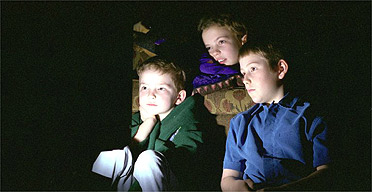
Children and teenagers are spending an average of two and a half months a year staring at screens, with many watching television before they go to school or have breakfast, according to research published today.
The study by the British Dietetic Association suggests young people spend 20% of their day watching TV, looking at a monitor or playing on a games console. And this time is in addition to time spent at school using computers in lessons.
The BDA polled 3,000 children to learn about their eating, exercise and leisure habits as part of its new campaign to encourage young people to become more active.
Of those interviewed, two-thirds said they watched 25 minutes of television before setting off for school. Most pupils, instead of walking or riding bikes, caught buses or coaches.
More than a third ate their evening meal in front of the television and one in five children interviewed said they skipped breakfast - almost a 10th said they did so because they preferred to stay in bed.
The research also showed that more than two-thirds of the teenagers polled admitted that they should do more physical activity, but 30% enjoyed the prospect relaxing after each school day.
Most health guidelines say youngsters should do at least half an hour of physical activity every day, while previous research from other organisations has shown that young couch potatoes are at risk of serious illnesses.
Frankie Phillips, a registered dietician and BDA spokesman, said: "Gadgets have such a powerful influence on youth culture today and it's shocking how long kids spend in front of a screen each day.
"There are so many demands on the time and energies that teenagers have, with school and college work, part-time jobs and socialising. It has also amazed us that there is no real help or guidance provided for teens - they really are a forgotten generation. Our aim is to change that.
"Through the campaign, we will show that moving more, eating out, smart snacking and making food last when you're on a budget can all fit in easily, if you get into healthy habits. The main key is just to move more to burn off the energy we're eating. Coupled with making time for regular meals, especially breakfast, reducing high-calorie foods and drinks and supersizing fruit and vegetable portions, everyone can aim for a healthier size."
The latest statistics from the British Medical Association show that there are around 1 million obese children in Britain. Soaring rates in obesity have led to an increase in childhood type two diabetes and will lead to more cases of heart disease, osteoarthritis and some cancers.
There are estimates that, if current trends continue, one-fifth of boys and one-third of girls will be obese by 2020.
The BMA recommends that the government should increase funding and improve access to sport and recreation facilities within schools and communities and that more should be done to protect the status of school playing fields.

